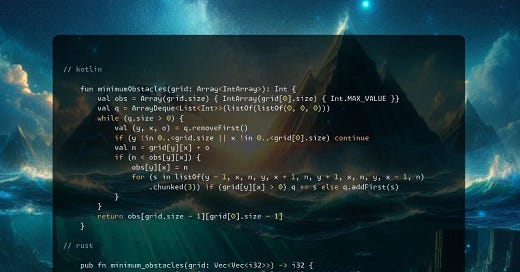# 28.11.2024 [2290. Minimum Obstacle Removal to Reach Corner]
Min removals to travel first-last in 2D grid #hard #bfs #dijkstra
28.11.2024
2290. Minimum Obstacle Removal to Reach Corner medium blog post substack youtube deep-dive
Join me on Telegram
Problem TLDR
Min removals to travel first-last in 2D grid #hard #bfs #dijkstra
Intuition
We are interested in the shortest path through obstacles, so the go-to algorithm is a BFS, then we optimize it with Dijkstra by moving only improved paths.
This simple optimization is not enough, however. So, we have another one — use a PriorityQueue to peek the smallest obstacles paths first.
And another cool trick: there are only two types of paths to sort— completely free and ones with obstacles. Free paths must go first. We completely drop the PriorityQueue and just add it to the front or to the back. (this is a 0-1 BFS https://codeforces.com/blog/entry/22276)
Approach
some other small optimizations are possible: we can stop searching at the first arrival to the end
we can use a two Queues instead of one
Complexity
Time complexity: $$O(nm)$$
Space complexity: $$O(nm)$$
Code
fun minimumObstacles(grid: Array<IntArray>): Int {
val obs = Array(grid.size) { IntArray(grid[0].size) { Int.MAX_VALUE }}
val q = ArrayDeque<List<Int>>(listOf(listOf(0, 0, 0)))
while (q.size > 0) {
val (y, x, o) = q.removeFirst()
if (y !in 0..<grid.size || x !in 0..<grid[0].size) continue
val n = grid[y][x] + o
if (n < obs[y][x]) {
obs[y][x] = n
for (s in listOf(y - 1, x, n, y, x + 1, n, y + 1, x, n, y, x - 1, n)
.chunked(3)) if (grid[y][x] > 0) q += s else q.addFirst(s)
}
}
return obs[grid.size - 1][grid[0].size - 1]
}
pub fn minimum_obstacles(grid: Vec<Vec<i32>>) -> i32 {
let mut obs = vec![vec![i32::MAX; grid[0].len()]; grid.len()];
let mut q = VecDeque::from_iter([(1, 1, 0)]);
while let Some((y, x, o)) = q.pop_front() {
if y < 1 || y > grid.len() || x < 1 || x > grid[0].len() { continue }
let n = grid[y - 1][x - 1] + o;
if n < obs[y - 1][x - 1] {
obs[y - 1][x - 1] = n;
for s in [(y - 1, x, n), (y + 1, x, n), (y, x - 1, n), (y, x + 1, n)] {
if grid[y - 1][x - 1] > 0 { q.push_back(s); } else { q.push_front(s); }
}
}
}; obs[grid.len() - 1][grid[0].len() - 1]
}
int minimumObstacles(vector<vector<int>>& g) {
int m = g.size(), n = g[0].size();
vector<vector<int>> obs(m, vector<int>(n, INT_MAX));
deque<tuple<int, int, int>> q; q.emplace_back(0, 0, 0);
vector<pair<int, int>>dxy{{-1, 0}, {0, 1}, {1, 0}, {0, -1}};
while (q.size()) {
auto [y, x, o] = q.front(); q.pop_front();
for (auto [dy, dx]: dxy) {
int ny = y + dy, nx = x + dx;
if (ny < 0 || ny >= m || nx < 0 || nx >= n || g[ny][nx] + o >= obs[ny][nx]) continue;
int n = g[ny][nx] + o; obs[ny][nx] = n;
if (g[ny][nx] > 0) q.emplace_back(ny, nx, n); else q.emplace_front(ny, nx, n);
}
} return obs[m - 1][n - 1];
}



